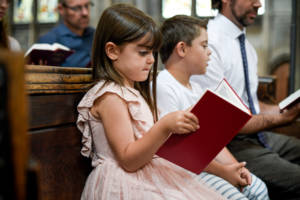Helping Your Children Find a Spiritual Center

Teaching your children to make moral decisions can be a challenge, but fortunately there are ways to help your children discover their spiritual center.
Being a parent is a difficult, though rewarding, experience. While you want to guide your children through life as best you can, you may also realize there are some areas where your little ones have to make their own decisions. Spirituality, for example, can be tricky. You may belong to a particular religion or ascribe to a certain system of beliefs but feel like your children have the right to find whatever it is brings them the most comfort. This may be challenging for some parents. Luckily, there are ways to help your children discover their spiritual center.
Teaching your children to make their own decisions comes down to providing them with the right materials. Consider these tips and see if you can find a way to guide your little ones to their own spiritual paths.
Spirituality and Religion
There are many differing opinions out there about spirituality and religion. Some people believe they are two separate concepts, while others firmly state spirituality and religion are one and the same. Before approaching a discussion of this nature with your children, you might find it helpful to determine how you view these topics. How do you define your faith when questioned about your religion? Are you Catholic? Buddhist? Do you practice your religion with a community, or is worship a private affair? These may not be questions you’ve spent much time on in the past.
By taking a bit of time to define a few points for yourself, you may find it easier to answer certain questions your children bring to you. If you identify as a Catholic and never attend church, your child might ask why. Without an answer, you could miss an opportunity to talk openly about religion with your kids. It can even be helpful to discuss this all with your significant other and approach the conversation like a team.
Moral Compass
For many, religious and spiritual beliefs help to define specific morals. Though children tend to discover morality through a number of life experiences, spirituality plays a very big part in how a child reacts to various situations. Stealing, for example, is considered an offense in almost all organized religions. Some say stealing upsets God; others say it is wrong to commit an act you wouldn’t want committed against you. Regardless of the reason, spiritual teachings can help a child avoid bad choices by remembering what he or she learned.
The morals and values learned through life may start as generalities like “don’t steal” and “don’t kill,” but personal spiritual beliefs tend to get much more specific as one grows older. A person who finds appreciation for nature and connects it to spirituality is likely to always show respect to the land. Someone who views kindness as a virtue is likely to practice being kind. Teach your children the morals you’d like to impart without force. Try to explain why certain things are good or bad, and your children will start to develop their own moral compasses.
Talk Tradition
Living a spiritual life is about more than personal beliefs and morals. The rituals associated with spirituality can also carry a lot of weight. Talk to your children about the traditions you know or that come from your family, whether it be prayers or relics or events. These are the concrete reminders of spirituality that your children are likely to remember throughout their lives. Even if your kids follow different spiritual paths, they may carry on certain traditions because they connect them to their family.
Guiding your child to his or her own spiritual path is a process. Over the years, you’re likely to have many conversations on the topic with your little ones. As long as you’re ready to engage and feel like you can teach them something, you’ll be doing the best you can to help your children along their way.

